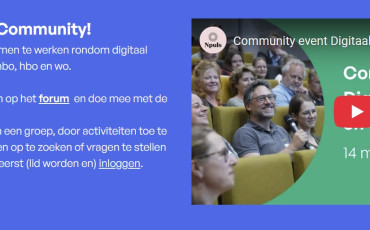Annette Peet
Kwartiermaker Digitaal toetsen en ontwikkelen bij Npuls Meer over Annette Peet
On 3 April, 2020, the Special Interest Group (SIG) Digital Assessment organised a second webinar together with SURF, following on from the webinar of 27 March, to share experiences around online proctoring as a solution for summative remote assessment. More than a hundred people watched the webinar live. During the webinar, we offered the stage to three online proctoring providers: RPnow, ProctorExam, and Proctorio, but first, we kicked off with a Q&A panel of experts from educational institutions.
In response to the many questions that reach us, we started the webinar by addressing the most frequently asked questions with a panel of experts. The panel consisting of Ludo van Meeuwen (Eindhoven University of Technology, where they already started with the first exams and plans to scale up to 600 students per exam), Maud Pols (University of Amsterdam, where they start the first exams using online proctoring on April 6), Silvester Draaijer (VU Amsterdam, where they are in the second week of online proctoring; exams are taken by 160 students, divided into two groups), Gerard Folkerts (Wageningen University&Research, where they have been administering exams via small-scale online proctoring for years, and are now scaling up to groups of 100). The panel addressed the following questions.
Maud Pols makes it clear that it is important to inform your students well. Maud shared two documents: one about starting with the assessment software and the other about working with online proctoring. Her tips were: test properly in advance and check that all settings are correct. It is also important to ensure students always have access to help during an exam. In a proctoring programme, this is usually possible via the chat function. In this way, 80% of the problems can be handled.
In general, this causes few problems. Especially if the test is administered in test software that lecturers and students are already familiar with. It is also important to use a good checklist which lists the various necessary settings. It also helps to explore the best solutions for each exam together with the lecturer. Choosing the simplest solution is usually a good idea.
It is important to inform the students about the consequences for their privacy in advance. It is very important to communicate clearly about the way in which privacy is guaranteed (Privacy statement), where students can find more info (for example in a Q&A), and where they can ask their questions about privacy.
If a student refuses to participate in an online proctored exam, you can look for alternatives. If there aren't any, you may choose to postpone the exam for this student.
The panel agrees it is an illusion to think you can make the security of an online exam 100% air-tight. This is generally no different to a written exam on paper in an examination room. However, with online proctoring, the use of a second camera is recommended to increase fraud detection. If a second camera isn't available, provide a 360-degree view of the student's environment in advance or use a mirror to get a better view of what is going on during the exam. In addition, the panel recommends as little effort as possible to be made on multiple-choice knowledge tests, which are by definition more susceptible to fraud.
We then gave the floor to three providers of proctoring systems that are currently of interest in The Netherlands. Below we have listed the main features of the different packages, to compare them, as well as a reference to more information. You can download the overview here.
|
|
RPnow |
ProctorExam |
Proctorio |
|
Integration with exam software & LMS |
Via LTI, as well as non-LTI integration options |
Remindo; TestVision, TeleToets, Optimum, NOA, WOOTS ANS, BlackBoard, Canvas, Moodle, B2L, Rugo, Surpass en stand-alone met een hyperlink. Not Cirrus |
Via LTI, API
|
|
How much time to get it up and running? |
30 min to install LTI |
1 week |
1h for technical part. Around 3 days for paperwork. |
|
How many tests can be taken at the same time? |
Unlimited |
50 test-takers per 15 minutes. 1200 sessions day |
We do not have a technical limitation but we need to be cautios bacause of support so up to 2k would be fasible at the moment. |
|
Type of proctoring |
On-demand Record & Review: incident reports (contains flags and comments by proctors and recordings of suspicious behavior). |
Record and Review with Proffesional Review or self-review. Direct chatting between school staff and students possible |
AI |
|
Security |
Secure browser monitors student computer to block programs |
Professional proctors with 5M proctored tests experience. Also self-review possible |
Video, audio, desktop recording, lock down browser, behaviour analysis, AI flagging... |
|
Check at students desk |
Room scan with camera |
Room scan with webcam, also ear scan. For smaller groups up to 30 test-takers also dual viewing possible. Mobile view, Webcam view and Desktop view |
Room scan with camera |
|
Identification of student |
Selfie & Photo ID card |
Snapshot of person, Snapshot of ID. Covering social numbers. No biometric data processed |
Auto ID - We will collect a picture of the student ID card that the institution will review. The institution may decide which identity cards to accept. |
|
Location of data processing |
AWS - United State |
Germany |
EU |
|
Are personal data processed |
Personal data processed includes student’s name, email address and an image of student’s ID card |
No biometric data is processed. Personal data is always processed in online proctoring |
Proctorio is not collecting personal data |
|
Hardware installation on harddrive student? |
Webcam and Microphone |
No |
no |
|
Costs |
Estimated fee per-student per-exam $10-15 USD |
Every public school receives for free a premium subscription for the rest of the academic year |
$7 - $5 per exam (based on volume) or $20 per license |
|
More information |
Mark Musachhio van RPnow (mmusacchio@psionline.com ) https://www.psionline.com/en-gb/platforms/rpnow/ |
Join daily free webinars on https://proctorexam.com/covid-19/ |
Proctorio (filipj@proctorio.com) https://proctorio.com/ |
Kwartiermaker Digitaal toetsen en ontwikkelen bij Npuls Meer over Annette Peet


0 Praat mee